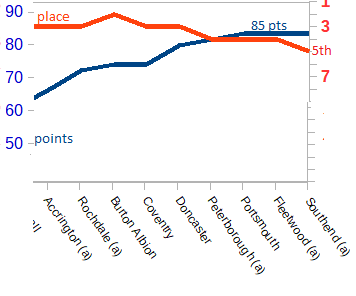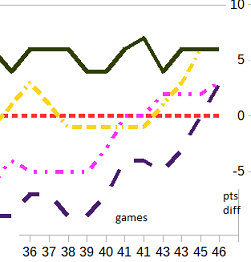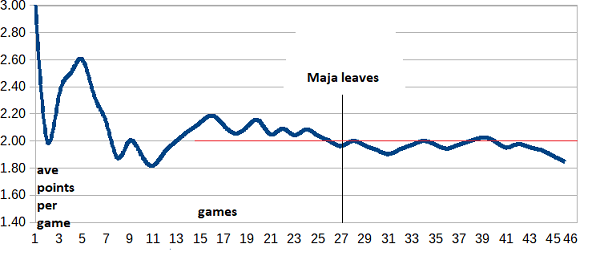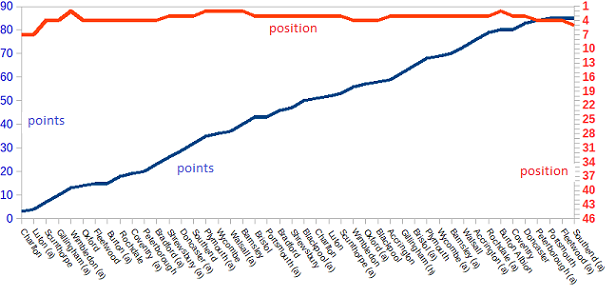Do we need to keep a sense of perspective? A year ago we were down and out. Now we’re just down, after failing at the final hurdle. But that was with a hastily assembled squad and a relatively inexperienced manager. We know there will be changes over the summer and we know when the fixtures come out we won’t be looking at other clubs and thinking “I’ll support them this season”. We are Sunderland, and we are Sunderland ’til we die.
That doesn’t mean we shouldn’t have an opinion on what did go wrong, because things did go wrong. In particular, in my own opinion, the transfer windows were not managed well. There had to be some latitude at the start of the season, given the changes we’d experienced, but what about January? By then problems were obvious but there were too many mistakes in addressing them and it cost us.
I’m going to try to show this below by the judicious use of stats, and have chosen some that back me up. It’s possible you won’t agree and you’re welcome to leave a comment, with or without stats of your own. In fact, I’d love to know what you think of my efforts and my conclusion.
To start, here’s our now traditional graph showing Sunderland’s points and position throughout the season. It’s a bit bare, considering all we went through, but there is an augmented version at the bottom of the page. For now, I’m focussing on points and position:
 We were close, right until the end, and those last few games appear to have cost us dearly, as you can see from the enlargement on the right.
We were close, right until the end, and those last few games appear to have cost us dearly, as you can see from the enlargement on the right.
It wasn’t just that we lost form which cost us, it was that our competitors picked up and went on good runs when we were faltering. Both Barnsley and Charlton won four of their last five games, losing the other. Portsmouth won two and drew two. Luton didn’t do as well, losing two and drawing one of their last five, but even this was better than our record of one win, two draws and two losses. I’ll return to this later.
The result of our loss and others’ gain of form can be seen in the next graph, which sets Sunderland as a baseline and shows how the clubs we have been watching since the start of the season compared with us on a game by game basis:
 There were always clubs above us, just not always the same ones. Peterborough had a flying start and Portsmouth were leaders for a good while and Barnsley always threatened despite a mid-season loss of form. It wasn’t until mid season that Luton joined the party, and once they did they made sure they stayed while others declined.
There were always clubs above us, just not always the same ones. Peterborough had a flying start and Portsmouth were leaders for a good while and Barnsley always threatened despite a mid-season loss of form. It wasn’t until mid season that Luton joined the party, and once they did they made sure they stayed while others declined.
 The graph to the right is an enlargement of the top right corner, covering the final few games of the season. You can see that by the time of the run-in Luton, despite their erratic finish, had enough points in the bank to keep well ahead of us and how Barnsley, Charlton and Portsmouth, who were lagging us at game forty, all picked up in those final games. Games in hand left us playing catch up, which we did, but we couldn’t sustain the effort and they passed us once more in those last four games. By the time Barnsley came to their final game, which they lost, it didn’t matter.
The graph to the right is an enlargement of the top right corner, covering the final few games of the season. You can see that by the time of the run-in Luton, despite their erratic finish, had enough points in the bank to keep well ahead of us and how Barnsley, Charlton and Portsmouth, who were lagging us at game forty, all picked up in those final games. Games in hand left us playing catch up, which we did, but we couldn’t sustain the effort and they passed us once more in those last four games. By the time Barnsley came to their final game, which they lost, it didn’t matter.
You might ask yourself what went wrong. Here are some things to consider:
- Injuries meant we couldn’t field a settled side and find our balance, a situation which was exacerbated by late signings, including players who weren’t ready.
- Clubs came to the SOL, or faced Sunderland at home, and played out of their skins. Some adopted a brutal approach which we couldn’t handle, not helped by poor refereeing.
All this played a part but I’d argue we were deficient in two areas. One was seeing games out, the other was that we lacked a killer punch. I’d also argue this was clear by half way through the season:
In the first 23 games we scored in every game, with a smattering of 3 and four goal wins, and we only lost twice. When we went ahead we did usually manage to see the game out. This made us look good but the reality was we were flattering to deceive because we also conceded in virtually every game (only 3 clean sheets in 23 games) and there were ten games where we only scored one goal. As a result we dropped a lot of points. If that wasn’t a clear enough signal, we didn’t always go ahead. We actually conceded first eleven times – that’s almost half of those games. When that happened we struggled to get more than a point, even at home, where we ended up drawing against Oxford, Fleetwood, Wycombe and Shrewsbury. While we did OK against the top clubs we couldn’t raise our game against many of the so-called weaker ones where we really should have scored more and conceded fewer goals.
These weaknesses in defence and attack could have been addressed in the January window. They weren’t, at least not effectively. We took on one defender on loan, a young loanee forward and two midfielders (to join the 347 midfielders we already had). The first of four games in January was a 1-0 win; the next three were 1-1 draws. February was much the same (another win followed by another three draws) although by then we had taken on a last-minute unfit forward to replace our departed leading scorer. It was no surprise it took until mid-February before we had a winning streak, one which was was too little, too late and left us with no leeway as the end of the season played out.
You might compare us with Luton, who began 2019 with two draws – against us and Barnsley, so not to be sniffed at – then plundered the upper leagues to loan an experienced defender, an experienced scorer and a young centre forward (injured, but they had cover) on deadline day. By then they had begun a winning streak (six wins on the bounce) which developed into a very long unbeated run. By the time they wobbled at the end of the season they already had enough wins on board.
Lars Knudsen has already commented on these weaknesses, with reference to our nineteen draws and the loss of Josh Maja:
I would get a sports psychologist to look at what 19 draws in 46 games says about the team’s collective mindset
We … ….missed Josh Maja and his clinical finishing. This has been a real factor in the second part of the season; one cannot easily replace a gifted finisher who scored 15 times before departing in controversial circumstances.
Some of our readers appear to agree about Maja, judging by their comments:
“The sad fact is letting Maja leave cost us promotion” (Drummer)
“We simply couldn’t hold onto Maja and it has cost us dear” (Joan)
This is worth a closer look because I’m not fully inclined to agree Maja’s loss was “a real factor in the second part of the season”.
 Maja played in 24 of our first 27 games. We scored 48 goals and gained 53 points in those 27 games. His personal tally was 15 goals, many of which turned out to be deciders – i.e. he scored in games we won by a single goal (as with Charlton on the opening day) or which we drew (as with game 2, where we drew 1-1 with Luton). This direct contribution can be valued at 18 points. In comparison Charlie Wyke played 25 games and scored 4 goals, one in our 1-1 draw at Oxford, one in our 2-1 win at Rochdale. That’s a direct contribution of 3 points. Will Grigg also scored four goals, in 15 games, but he only scored one decider, in our 2-1 win against Walsall. Unlike Maja, Wyke and Grigg were not difference makers. We’re better off looking at players like McGeady for that. His goals – many of them deciders – were worth at least 11 points.
Maja played in 24 of our first 27 games. We scored 48 goals and gained 53 points in those 27 games. His personal tally was 15 goals, many of which turned out to be deciders – i.e. he scored in games we won by a single goal (as with Charlton on the opening day) or which we drew (as with game 2, where we drew 1-1 with Luton). This direct contribution can be valued at 18 points. In comparison Charlie Wyke played 25 games and scored 4 goals, one in our 1-1 draw at Oxford, one in our 2-1 win at Rochdale. That’s a direct contribution of 3 points. Will Grigg also scored four goals, in 15 games, but he only scored one decider, in our 2-1 win against Walsall. Unlike Maja, Wyke and Grigg were not difference makers. We’re better off looking at players like McGeady for that. His goals – many of them deciders – were worth at least 11 points.
Looking at team stats, with Maja we earned 53 points in 27 games = 1.96 points per game. We scored 48 goals in those 27 games = 1.78 goals per game. In the 19 games after Maja left we scored 32 goals, earning 32 points. That’s 1.68 points and 1.68 goals per game.
This is illustrated well by the 2 points per game benchmark to which Jack Ross often referred. Have a look at the graph below.
 We dropped below 2ppg around the time Maja left and although we did get above the line a couple of times after his departure it was never by enough to generate breathing space. The final loss of form took us well below 2ppg (over the season SAFC averaged 1.85 points per game) and the battle for a top 2 place was lost. From that perspective it would appear that losing Maja did make a difference. In fact from this point of view Lars’ comment “cannot easily replace” looks like an understatement.
We dropped below 2ppg around the time Maja left and although we did get above the line a couple of times after his departure it was never by enough to generate breathing space. The final loss of form took us well below 2ppg (over the season SAFC averaged 1.85 points per game) and the battle for a top 2 place was lost. From that perspective it would appear that losing Maja did make a difference. In fact from this point of view Lars’ comment “cannot easily replace” looks like an understatement.
However, some things contradict the notion that losing Maja did make a difference.
Firstly, let’s not forget we had problems with both defence and attack from the start. When it comes to our propensity to draw there’s not a lot of difference pre and post Maja;
Draws with Maja in the squad: 11/27 = 40.7%
Draws afer Maja left: 8/19 = 42.1%
(overall 19/46 = 41.3%)
Maja’s presence or absence had little affect on our inability to convert draws to wins, and not being able to force wins or hold on to leads (at Luton and Coventry, and at home to Peterborough) was a major factor in our failure.
Consequently, even with Maja Sunderland were averaging less than two points per game. Had Sunderland maintained their average of 1.96 ppg they would have finished with 1.96 x 46 = 90 points. That wouldn’t have been enough. Barnsley managed 1.98 points per game and that gave them 91 points. We would still have finished below Barnsley, not to mention Luton, whose 2.04 points per game left them well ahead.
One interpretation of these stats is that we were better with Maja, but not much, and losing him made no difference to our final position being outside the top two.
Personally, when working out what happened I was more inclined to look at the circumstances surrounding the last few games where, as Lars puts it,
we finished 6 points off automatic promotion, with Luton and Barnsley showing greater momentum than the Black Cats in getting over the line.
Was that because of the Checkatrade adventure? Or was it just the fixture fairy, other cup runs and weather combined to give us the toughest run-in by far? That was where my graphs were taking my thoughts until I looked at our drawing and conceding record over the season. I’d have originally argued we were left with injured players running on empty as April unravelled and congestion loaded us with hard-to-win games. Now I think the damage was done long before we got to April. In truth, we were flawed from early on, we didn’t deal with it and that set us up to fail when we had no margin for error at the end of the season.
But Maja’s departure does create room for conjecture because he was a difference maker, and a good’n at that. He did come up with game-winning goals, and he did it often.
So, for example, let’s consider Barnsley. We took 4 points from Barnsley, winning at the SOL (Maja scored) and drawing 0-0 at Oakwell, the only league game in which we didn’t score. Maja had left six games previously. Had he stayed and continued to score deciders we may have gained an additional two points while Barnsley would have lost one. That and another win elsewhere might have seen us go up in second place.
That might be a bit tenuous so here’s another scenario, one I think could resonate.
Maja stays, we maintain our 1.96 points average and we end up on 90 points, still behind Barnsley and Luton. We make the playoff final and face Charlton at Wembley. Who would you play up front, Maja or Wyke? (Will Grigg wouldn’t have been needed). I’d back Maja to do the business where Wyke (and Grigg) couldn’t. Would you? By keeping Maja we’d have lost a transfer fee, but we might have gained promotion.
How helpful is such speculation? The answer is not at all. Whether or not the club were right to cash in on Maja will remain a moot point. But, having looked at the stats, and seen the gulf between Maja and Wyke when it comes to match-deciding goals, I can’t help wondering if Lars does have a point. That’s because it’s easy to take stats too seriously, to forget anything can happen in the alternative universe of a football fan’s mind. Stats do have their uses but often that’s nothing more than to help the kind of discussion that pre-match pints are made for.

But let’s return to my premise, that we didn’t do the business in the transfer window.
We have form, of course, from the pursuit of Fabio Borini to the signing of Kazenga Lua Lua (who turned out to be OK once he was fit, which was after he left us). Last season’s windows were no different. Charlie Wyke came three days before the season started but with a groin injury. Will Grigg was signed late, expensively and also with an injury. Neither was able to make the kind of impact we needed. Luton got it right, we got it wrong. They brought in players to augment a well-performing squad and late and injured was manageable. We needed an immediate solution and had no chance of getting it.
The message is simple. Sign players early, make sure they are fit. If their parent club rejects offers or they aren’t ready to play be prepared to walk away. Think long and hard about what a player is for. Both Wyke and Grigg might come good next season but neither was capable of solving an immediate problem. Are there fit players of the equivalent calibre elsewhere? Has the price been jacked up? And what about our Academy? You might remember that Maja had shown promise but was only brought in because there was no-one else available against Charlton. Bali Mumba also started that game. Did our subsequent signings improve on him?
The opposite case also holds true. Don’t allow key players to leave until a replacement is signed. And, perhaps, bite a financial bullet and say no?
There are lessons to be learned from last season. Let’s hope our relatively inexperienced manager and owners have taken them on board and we get this season’s windows right. It could make all the difference.


Splendid! It’s good to have a “no nonsense” analysis that John always provides to balance the “impression” basis that we often make judgements based upon.
Nice article.
I’m firmly in the ‘losing Maja made a difference’ camp. In my half term report mid January i stated that the no1 target of the window was NOT to lose Maja. We lost him to a principle. The piss take had to stop, because someone said it had to. The same person then had the piss took with GRIGG! Our owners are nice folk, well Stewart is, but naive is an understatement. That said books are balanced and we start next year more experienced and hopefully wiser.
Exce?lent piece with honest self critique….which we know Safc now also needs
A flying start, convert 6 of the draws to wins and ignore the Cups i.e let the kids terrorise them
100 points is there to be achieved